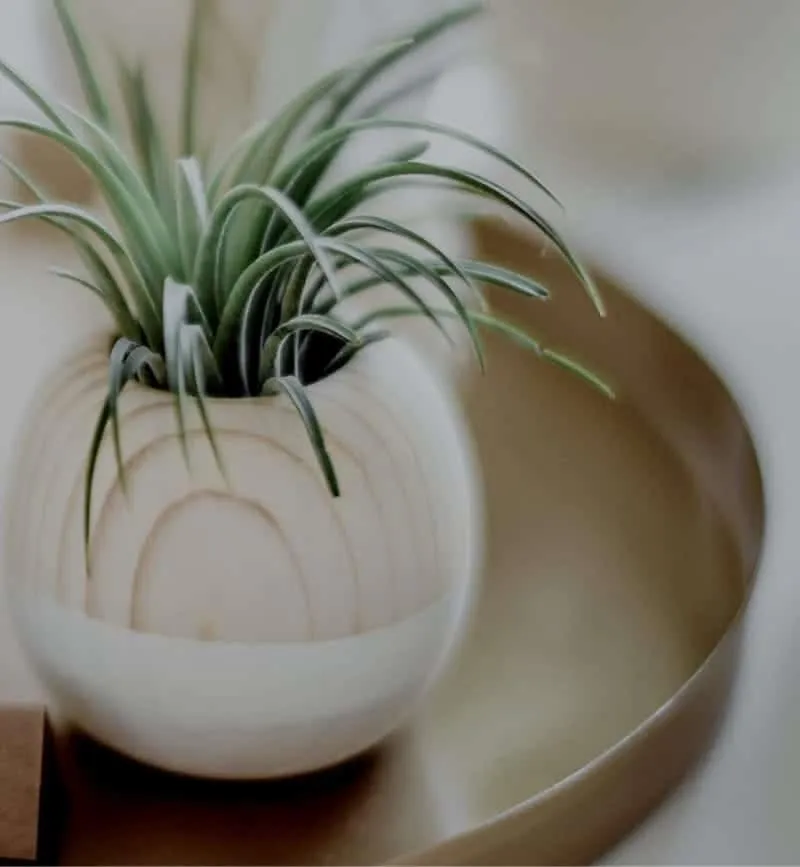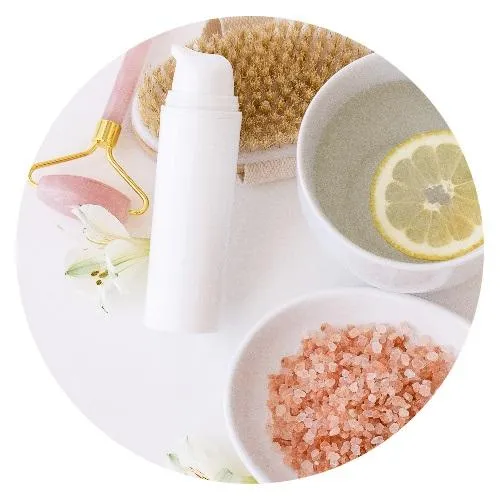
Hi! I'm Edwina.
Welcome to
my World of
Wellness.



Self-Care
Healthy Eating
Clean Beauty
Natural Health
Lifestyle
BLOG ARTICLES

TEN SKIN CARE INGREDIENTS TO AVOID
Are you aware that whatever you apply to your skin is quickly absorbed into your blood stream? It’s true! Here’s how it happens:
Our skin is not only our body’s largest organ, but it is completely covered with thousands of tiny, microscopic pores.
Our pores absorb what we massage onto our skin and then carries it into our tiny capillaries (hair-like veins), which in turn carry those ingredients into our blood streams….many times within 30 seconds or less. Whew!
That’s why adapting plant-based skin care products into your daily hygiene regimen is better for your overall health.
FYI, this post contains affiliate links. This allows us to provide valuable content to our readers and make a small commission, but at no cost to you. Read our full disclosure.
For a cleaner, plant-based daily hygiene regimen, you can start with using sulfate-free body washes that are scented with pure essential oils, followed by a paraben-free lotion to replace the moisture back into your skin.
Choose a natural body moisturizer that is LOADED with nutrient-rich, plant-based oils that leave a healthy, protective barrier on your skin.
Also, seek out a natural, effective deodorant to use to avoid absorbing aluminum or phthalates into your body….especially near the breast area!
Then last, but certainly not least, because your mouth is THE most absorbent part of your body, it’s a good idea to use a natural toothpaste that is not made with toxic ingredients.
Even if you are not swallowing the toothpaste, remember, it’s still being absorbed into your body through your mouth….AND at a faster rate than ingredients are absorbed into your skin!
We could all benefit from using more natural skin care products so that we do not create a more toxic environment from within our bodies.
To build your knowledge base, here is a list of 10 non-plant-based ingredients that are commonly found in conventional skin care products:
1.) PARAFFIN WAX
Paraffin wax is a derivative of petroleum and is produced during the oil refining process. (1)
It is the sludge that remains after processing and cleaning up the petroleum oil to make it safe for use in our automobiles.
Due to its waxy consistency, paraffin is used as an emulsifier in some skin care products.
However, paraffin can clog the pores of your skin, inhibiting your skin’s natural ability to sweat and eliminate toxins.
2.) FRAGRANCE OILS
Fragrance oils are usually listed as “parfume” on the ingredient decks of personal care products.
What you don’t realize, though, is that a fragrance oil is a combination of anywhere from 50 to over 275 chemicals that have been combined to mimic a specific scent. (2)
For example, a fragrance oil can be blended to smell like a lemon, buttered popcorn, cotton candy, etc.
Many skin care products contain fragrances to make them more appealing to a potential customer. However, all of those unidentified chemicals that comprise the fragrance oil can cause irritation to a person’s skin.
Plus, they get absorbed into the body through the pores of your skin.
We all enjoy using products that smell delightful. However, for our health's sake, why not opt for products that have been scented with plant-based, pure essential oils?
Not only will you feel and smell fresh and clean, but you will also reap the therapeutic benefits of those delightful essential oils.
3.) PROPYLENE GLYCOL
Historically, the ingredient, propylene glycol was made from petroleum (aka, crude oil). (3)
It is often times used as a humectant in skin care products due its ability to absorb water.(4)
Humectants bind moisture to themselves and any surface they come into contact with (in this example, your skin). So, propylene glycol is used to enhance a skin care product’s moisturizing ability.
Over the years, increasing health concerns of using products made with propylene glycol has caused several manufacturers of consumer packaged goods to become more responsible and make the switch from using petroleum-based to plant-based propylene glycol.
We just don’t know which ones they use unless they specifically disclose this information on their package labels.
You will find propylene glycol listed in products such as deodorant, shampoo, toothpaste, several food products (as a flavor enhancer), and, fragrance (yes, perfume!).
Try to use products that contain vegetable glycerin (also known as “glycerol”) vs. propylene glycol.
Vegetable glycerin is a natural agent (produced from plant oils) that also draws moisture to itself (5), but without concerns of toxicity.
4.) MINERAL OIL
Mineral oil is a derivative of petroleum (6) and it is created during the oil refining process of crude oil. It is used as the oil ingredient in many skin care products.
However, unlike natural plant-based oils, there is no nutritional value in mineral oil. In addition, the molecules that comprise mineral oil are too large to penetrate the pores of your skin.
When applied to the skin, mineral oil can inhibit your skin’s natural ability to breathe (sweat out toxins) or absorb moisture.
It is beneficial to opt for skin care products that are made with plant-based fruit or vegetable oils such as sweet almond oil, olive oil coconut oil, or avocado oil.
These plant-based oils are easily assimilated into your skin. You will benefit from the vitamins and minerals that are inherent in those natural oils.
5.) UREA
Although your body naturally produces its own urea through bodily waste, there is a man-made urea that is used as a preservative in personal products. It is made from ammonia and carbon dioxide. (7)
As a skin care product preservative, urea is commonly listed as Imidazolidinyl Urea and Diazolidinyl Urea. They are highly water soluble and easily absorbed into the pores of your skin. They are also reported to release formaldehyde and cause contact dermatitis. (8)
Since ureas are easily absorbed into the skin, they will quickly travel into the bloodstream and throughout the body.
If possible, try to avoid products that are made with urea.
6.) PHTHALATES
Phthalates (pronounced thal-ates) are plasticizers that are used in cosmetics to make those products more pliable and give them a creamy consistency. (9)
You can find phthalates in products such finger nail polish and skin moisturizers.
Reportedly, phthalates can be a hormone disruptor. (10) They are not conspicuously listed on the ingredient decks of personal care products.
Many times they are listed as “fragrance”. To be sure that you are avoiding them, look for products that declare to be phthalate-free.
7.) TRICLOSAN
Triclosan is an antibacterial agent used in many personal care products to provide germ-killing activity. (11)
However, triclosan reportedly disrupts the endocrine system. (12) Some products that contain triclosan are toothpaste, deodorant and liquid hand soap.
As for the efficacy of antimicrobial soaps that contain triclosan, studies have shown that there is no proof that it provides better disinfectant properties than regular soap and water. (13)
Try to choose skin care products that don’t include this ingredient.
8.) ARTIFICIAL COLORS
Most synthetic colors are made from a base of petroleum. (14)
This is not a pleasant thought considering many consumer products are made with artificial colors to enhance their appeal to consumers (e.g., food coloring).
Think about the blue-hued blueberry scented body wash or the bright pink colored strawberry flavored pastry. Chances are they contain synthetic colors.
Artificial colors can be linked to skin irritation, skin sensitivity, and other health problems. (15) They contain heavy metals which adversely affect bodily organs like the liver and kidneys. (16)
You will find artificial colors in products such as lipstick, eye shadows, and moisturizers.
Natural skin care products that are made with plant-based colorants are healthier alternatives. Some of these alternatives are beet powder, blueberry powder, or alkanet root powder.
9.) SULFATES (aka, SLS)
Sulfates are surfactants, or foaming agents, that are found in many products that produce suds when water and friction are applied.
They are not a natural soap and are usually listed under the names sodium laureth sulfate or sodium laurel sulfate (SLS). They have been known to cause contact dermatitis on the skin. (17)
What’s more is that sulfates can easily penetrate the skin and will help other ingredients penetrate the skin more effectively (18) (19), too, whether that ingredient is safe or unsafe.
You may want to opt for coconut oil-based cleansers instead. For true soap makers, coconut oil is the oil of choice because it is what gives real soap its lathering ability.
And coconut oil is safer to use on skin.
10.) PARABENS
Parabens are preservatives (20) that are used to prevent the growth of bacteria in many skin care products, especially products with water content.
The four commonly known parabens are butyl-paraben, methyl-paraben, ethyl-paraben, and propyl-paraben.
The concern about the use of parabens as a preservative is that they reportedly disrupt hormonal functions in the body. (21)
For women this means that parabens can mimic estrogen in the body and has been linked to breast cancer. (22)
For men parabens can affect the production of sperm because it affects the secretion of testosterone. (23)
Although the amount of parabens found in personal care products is relatively small, with daily use it can still get stored in fatty tissue throughout the body and build up over time to create unhealthy side effects.
Remember, your skin absorbs whatever you apply to it, so try to use products made with as many natural, plant-based ingredients as possible.
KEY TAKEAWAYS
Taking baby steps will help eliminate the stress of “greening up” your beauty regimen and, in the end, you will be taking better charge of you and your family members’ health.
The contents of this article is for informational purposes only. It is not intended to cure, prevent, diagnose or treat any ailments.
Consult with your licensed professional health practitioner before starting a new health regimen or regarding any health issues you may have.
Join My Wellness List.
DISCLAIMER
The content on this website is for informational purposes only and has not been evaluated by the FDA. It is not intended to treat, cure, prevent, or diagnose any illness or disease. Always consult with your licensed medical professional prior to incorporating any of the suggestions or comments herein or regarding any health issues you may have.
Copywrite 2024 Clean and Pure Life | All rights reserved.




